UNIT3电子教案
ESAP商学英语教程-电子教案Unit3
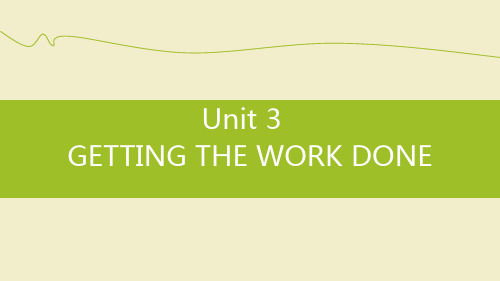
3.1 Vocabulary F Complete each sentence with a word from box b.
Change the form if necessary.
1 Many organizations use e-mail as a convenient form of_i_n_t_er_n_a_lcommunication. 2 Employees who are badly paid may become _d_e_m_o_t_iv_a_t_e_d. 3 If a team consists of people from several different departments it is said to be _m__u_lt_id_i_s_c_ip_l_in_a_r.y 4 A team needs to be _u_n_i_te_d____ in order to work well. 5 It is important to _e_n_su_r_e__ that people have good working conditions. 6 People who think they are no good at anything have low _se_l_f-_e_s_te_e_m_.
Vocabulary bank
Stress within words
This is true for most words ending in:
Multi-syllable words
Some content words have three or more syllables. Multi-syllable words are normally stressed three syllables from the end.
新生代英语基础教程Unit 3电子教案

C Listen and complete the conversation.
Jenny: Hey Alex, do you want some of this dessert? It’s really (1)
2. Alex ate a lot of pasta when he went to Italy last week.
3. Tomatoes, mushrooms and carrots are vegeta.bles
4. Most people eat French fries with a hamburger.
. You only live once!
Alex: OK, OK, I’ll try it…
参考译文
参考译文
珍妮:嗨,亚历克斯,想来点这个甜点吗?非常好吃! 亚历克斯:不,谢谢,珍妮。我正在减肥。 珍妮:哦,我知道了。那炸薯条要吗?它们也很好吃。 亚历克斯:嗯……我想我还是就吃点沙拉吧。 珍妮:好的。那喝点什么呢?苏打水吗? 亚历克斯:不了,谢谢。我还是来点不加糖的冰茶吧。 珍妮:哦,来点甜点吧。你也就活这么一次! 亚历克斯:好吧好吧,那我尝尝。
!
Alex: No thanks, Jenny. I am trying to lose weight.
Jenny: Oh, I see. How about some (2)
? They are really good!
Alex: Hmm. I think I’ll just have some of this (3)
(G6)Unit3电子教案
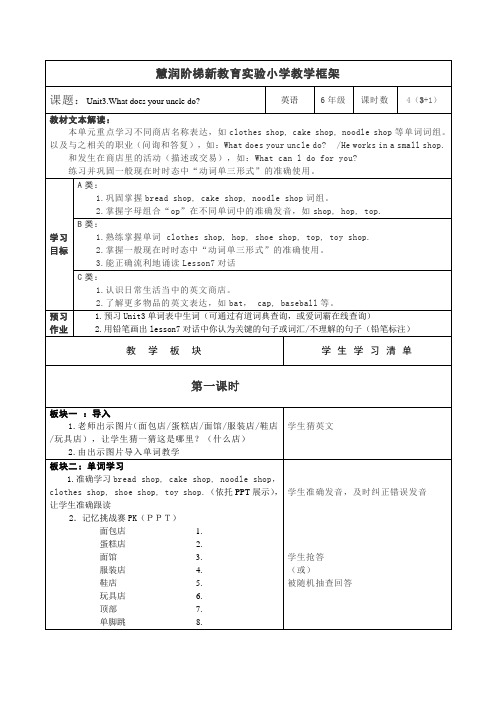
慧润阶梯新教育实验小学教学框架课题:Unit3.What does your uncle do?英语6年级课时数4(3+1)教材文本解读:本单元重点学习不同商店名称表达,如clothes shop, cake shop, noodle shop等单词词组。
以及与之相关的职业(问询和答复),如:What does your uncle do? /He works in a small shop.和发生在商店里的活动(描述或交易),如:What can l do for you?练习并巩固一般现在时时态中“动词单三形式”的准确使用。
学习目标A类:1.巩固掌握bread shop, cake shop, noodle shop词组。
2.掌握字母组合“op”在不同单词中的准确发音,如shop, hop, top. B类:1.熟练掌握单词 clothes shop, hop, shoe shop, top, toy shop.2.掌握一般现在时时态中“动词单三形式”的准确使用。
3.能正确流利地诵读Lesson7对话C类:1.认识日常生活当中的英文商店。
2.了解更多物品的英文表达,如bat, cap, baseball等。
预习作业1.预习Unit3单词表中生词(可通过有道词典查询,或爱词霸在线查询)2.用铅笔画出lesson7对话中你认为关键的句子或词汇/不理解的句子(铅笔标注)教学板块学生学习清单第一课时板块一:导入1.老师出示图片(面包店/蛋糕店/面馆/服装店/鞋店/玩具店),让学生猜一猜这是哪里?(什么店)2.由出示图片导入单词教学学生猜英文板块二:单词学习1.准确学习bread shop, cake shop, noodle shop,clothes shop, shoe shop, toy shop.(依托PPT展示),让学生准确跟读2.记忆挑战赛PK(PPT)面包店 1.___________蛋糕店 2.__________面馆 3.__________服装店 4.__________鞋店 5.__________玩具店 6.__________顶部7.__________单脚跳8.__________ 学生准确发音,及时纠正错误发音学生抢答(或)被随机抽查回答3.核对答案板块三:对话练习1.让学生尝试自读lesson7对话2.老师示范对话(PPT图示及翻译)并让学生跟读3.翻译重点词组(如works in,等)4.标注重点句子,where is Harry’s father? /What does your father do?5.依据对话中的部分句子进行句式变化。
人教PEP版五年级英语上册《Unit3》全单元教案教学设计小学优秀公开课

人教PEP版五年级英语上册教学设计Unit3What would you like?一、单元整体分析本单元是义务教育人教版(pep)小学英语教科书五年级上册的第三单元。
主要围绕话题What would you like?引出A、B、C三个板块的内容。
A、B部分呈现两组情景对话、一些重点词汇和一篇阅读小短文等新知识点,C部分是以讲趣味故事形式巩固或延展知识面。
本单元的学习主题是讨论饮食习惯,学习一些日常食品饮料类单词,并学会用一些形容词来描述食物特征。
重点呈现核心句型What would you like?/What’s your favourite food?民以食为天,饮食爱好是学生们平时谈论比较多的话题,这些十分贴近生活的话题,可以瞬间激发学生们的浓厚情趣,把新的知识点融入到学生们的真实生活中,学生们更喜欢学习,更愿意接受,并能很快达到内化的程度。
本单元共分六个课时,A、B两部分中的情景对话都是展示重点知识内容即本单元两个核心句型的具体语言环境,Let’s learn中所教学的重点词汇为学生练习使用关键句型提供多元化的素材,让学生们掌握更多的常见食物饮料的名称以及描述食物特征的形容词,包括A部分出现的ice cream,hamburger,salad, sandwich,tea,以及B部分出现的delicious,fresh,sweet,hot,healthy。
这些词汇能够拓宽学生们的知识面,增加学生们的词汇量,为提高表达能力打下基础。
第五课时的Read and write和Let’s check均是为巩固本单元重点知识而设计的精简训练。
第六课时中的情趣故事是学生们最喜欢的板块,通过观看动画课件视频,模仿表演,学生们把本单元学会的新知识融入到虚构的故事情节当中,把故事内容活灵活现的展现在众人面前,让学生们感受着自己的进步、成功与喜悦,这就是学习收获的最高巅峰。
本单元重点在于讨论人物的日常饮食习惯,描述各种食物饮料的特征,想要学好本单元,学生应该对一些常见水果、蔬菜以及其它食物的名称是什么,味道怎么样等有一定了解。
新时代明德大学英语电子教案unit3
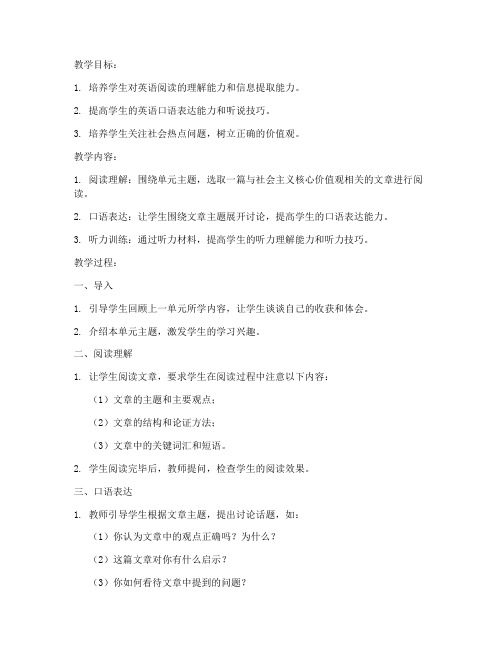
教学目标:1. 培养学生对英语阅读的理解能力和信息提取能力。
2. 提高学生的英语口语表达能力和听说技巧。
3. 培养学生关注社会热点问题,树立正确的价值观。
教学内容:1. 阅读理解:围绕单元主题,选取一篇与社会主义核心价值观相关的文章进行阅读。
2. 口语表达:让学生围绕文章主题展开讨论,提高学生的口语表达能力。
3. 听力训练:通过听力材料,提高学生的听力理解能力和听力技巧。
教学过程:一、导入1. 引导学生回顾上一单元所学内容,让学生谈谈自己的收获和体会。
2. 介绍本单元主题,激发学生的学习兴趣。
二、阅读理解1. 让学生阅读文章,要求学生在阅读过程中注意以下内容:(1)文章的主题和主要观点;(2)文章的结构和论证方法;(3)文章中的关键词汇和短语。
2. 学生阅读完毕后,教师提问,检查学生的阅读效果。
三、口语表达1. 教师引导学生根据文章主题,提出讨论话题,如:(1)你认为文章中的观点正确吗?为什么?(2)这篇文章对你有什么启示?(3)你如何看待文章中提到的问题?2. 学生分组讨论,每组推选一名代表进行发言。
四、听力训练1. 教师播放听力材料,要求学生认真听并记录关键信息。
2. 学生回答听力问题,教师检查学生的听力理解能力。
五、总结与反思1. 教师总结本节课所学内容,强调重点和难点。
2. 学生谈谈自己的学习体会,分享学习心得。
教学资源:1. 教材:新时代明德大学英语综合教程32. 阅读材料:与社会主义核心价值观相关的文章3. 听力材料:与文章主题相关的听力材料教学评价:1. 学生对阅读材料、口语表达和听力训练的掌握程度。
2. 学生参与课堂活动的积极性和主动性。
3. 学生对社会主义核心价值观的理解和认同。
教学反思:1. 教师应根据学生的实际情况调整教学内容和方法,提高教学效果。
2. 注重培养学生的自主学习能力,引导学生主动参与课堂活动。
3. 关注学生的情感态度,激发学生的学习兴趣,提高学生的综合素质。
大学英语综合教程4电子教案unit3

一、教学目标1. 知识与技能:- 掌握并运用与职业规划相关的词汇和短语。
- 理解并分析职业规划的重要性及其在个人发展中的作用。
- 通过阅读和讨论,提高英语阅读理解和口语表达能力。
2. 过程与方法:- 通过小组讨论和角色扮演,培养学生团队合作和沟通能力。
- 通过分析案例,提高学生的问题解决和分析能力。
3. 情感态度与价值观:- 培养学生对职业规划的正确认识,树立正确的职业观念。
- 增强学生的自信心和自我认知能力。
二、教学内容1. 课文内容:- 职业规划的重要性- 职业规划的步骤- 个人兴趣、能力和价值观与职业选择的关系2. 辅助材料:- 职业规划相关网站和书籍- 职业规划案例分析三、教学过程1. 导入新课(5分钟)- 通过提问的方式,引导学生思考以下问题:- 你对未来的职业有什么规划?- 你认为职业规划的重要性是什么?- 引入课文主题,激发学生的学习兴趣。
2. 课文阅读(20分钟)- 学生自主阅读课文,完成课后练习题。
- 教师讲解课文中的重点词汇和短语,帮助学生理解课文内容。
3. 案例分析(15分钟)- 教师提供职业规划案例分析,引导学生分析案例中的关键因素。
- 学生分组讨论,分享自己的观点和看法。
4. 小组讨论(20分钟)- 将学生分成小组,讨论以下问题:- 如何进行职业规划?- 如何根据自己的兴趣、能力和价值观选择职业?- 小组代表分享讨论成果,教师点评。
5. 角色扮演(15分钟)- 学生分组进行角色扮演,模拟面试场景。
- 教师观察并给予指导,帮助学生提高面试技巧。
6. 总结与作业布置(5分钟)- 教师总结本节课的重点内容,强调职业规划的重要性。
- 布置作业:写一篇关于自己职业规划的短文。
四、教学评价1. 课堂参与:观察学生在课堂上的发言、讨论和角色扮演情况,评价其参与度。
2. 课后作业:检查学生完成课后作业的情况,评价其学习效果。
3. 小组讨论和角色扮演:评价学生在小组讨论和角色扮演中的表现,包括团队合作、沟通能力和问题解决能力。
高一英语必修一unit3教案
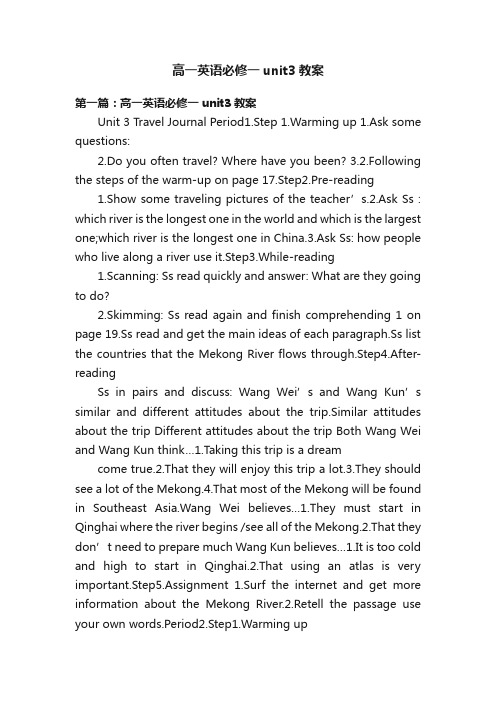
高一英语必修一unit3教案第一篇:高一英语必修一unit3教案Unit 3 Travel Journal Period1.Step 1.Warming up 1.Ask some questions:2.Do you often travel? Where have you been?3.2.Following the steps of the warm-up on page 17.Step2.Pre-reading1.Show some traveling pictures of the teacher’s.2.Ask Ss : which river is the longest one in the world and which is the largest one;which river is the longest one in China.3.Ask Ss: how people who live along a river use it.Step3.While-reading1.Scanning: Ss read quickly and answer: What are they going to do?2.Skimming: Ss read again and finish comprehending 1 on page 19.Ss read and get the main ideas of each paragraph.Ss list the countries that the Mekong River flows through.Step4.After-readingSs in pairs and discuss: Wang Wei’s and Wang Kun’s similar and different attitudes about the trip.Similar attitudes about the trip Different attitudes about the trip Both Wang Wei and Wang Kun think…1.Taking this trip is a dreamcome true.2.That they will enjoy this trip a lot.3.They should see a lot of the Mekong.4.That most of the Mekong will be found in Southeast Asia.Wang Wei believes…1.They must start in Qinghai where the river begins /see all of the Mekong.2.That they don’t need to prepare much Wang Kun believes…1.It is too cold and high to start in Qinghai.2.That using an atlas is very important.Step5.Assignment 1.Surf the internet and get more information about the Mekong River.2.Retell the passage use your own words.Period2.Step1.Warming upAsk some Ss to retell the passage that they have learnt last period.Step2.Learning about the languageTeacher explains some language points in the text on page 18.1.Persuade sb.into /out of sth.: cause sb.(not)to do sth.by arguing or reasoning with him 说服或劝说某人(不)做某事He is easily persuaded.Wang Kun couldn’t persuade his sister to change her mind.persuade sb.(that clause): cause sb.to believe sth.;convince sb.使某人信服How can I persuade you that I am telling the truth?2.insist(v.): demand(sth)forcefully, not accepting a refusal 坚持或坚决要求;eg.Since he insisted, I had to stay.insist on sth/doing sth: require or demand;refuse to accept an alternative 一定要(某事物),坚决主张She insists on getting up early and playing her radio loud.3.care about: be worried, concerned or interested 忧虑,关心,惦念don’t you care about anybody? I don’t care about what happens to him.care for /to do: be willing or agree to do sth.;wish or like to do sth.Would you care a drink? Would you care to go for a walk? care for sb.1).Like or love sb.He cares for her deeply.2).Look after sb;take care of sb;be responsible for sb Who will care for your child if you are out?4.Once she has made up her mind, nothing can change it.她一旦下了决心,什么也不能使她改变。
大学体验英语综合教程1第三版Unit3电子教案
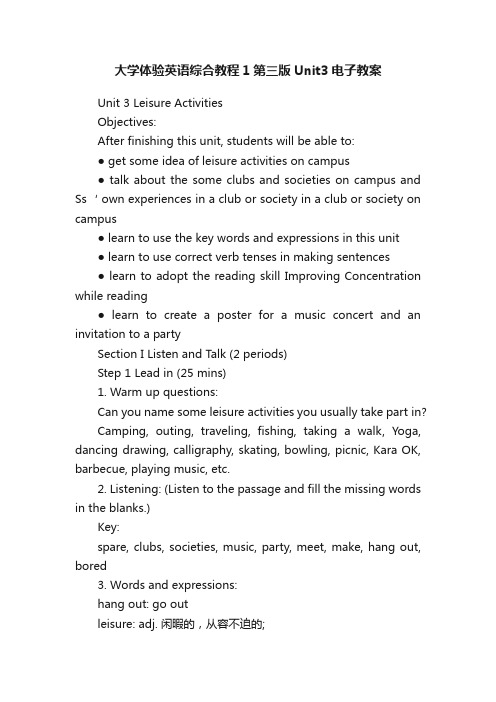
大学体验英语综合教程1第三版Unit3电子教案Unit 3 Leisure ActivitiesObjectives:After finishing this unit, students will be able to:● get some idea of leisure activities on campus● talk about the some clubs and societies on campus and Ss‘ own experiences in a club or society in a club or society on campus● learn to use the key words and expressions in this unit● learn to use correct verb tenses in making sentences● learn to adopt the reading skill Im proving Concentration while reading● learn to create a poster for a music concert and an invitation to a partySection I Listen and Talk (2 periods)Step 1 Lead in (25 mins)1. Warm up questions:Can you name some leisure activities you usually take part in?Camping, outing, traveling, fishing, taking a walk, Yoga, dancing drawing, calligraphy, skating, bowling, picnic, Kara OK, barbecue, playing music, etc.2. Listening: (Listen to the passage and fill the missing words in the blanks.)Key:spare, clubs, societies, music, party, meet, make, hang out, bored3. Words and expressions:hang out: go outleisure: adj. 闲暇的,从容不迫的;adv. leisurely4. Look at the pictures and try to say something about leisure activities. (Pair-work) Brain storm questions:What leisure activities are they taking?Have you taken part in the similar leisure activities as them?Step 2 Dialogues (30 mins)1. Listening to the two sample dialogues and learning some useful phrases and expressionsDialogue 1 At a PartyDialogue 2 At a Concert2. Post-listening questionsWhat do they do at a party?Who will Zhang introduce to Connie?What kind of music band does Mei like? Why?3. Phrases and expressions:in full swing: take part inThey are eating me out of house and home. 他们把我吃穷了。
新职业英语职业综合英语Unit3BusinessMeals电子教案
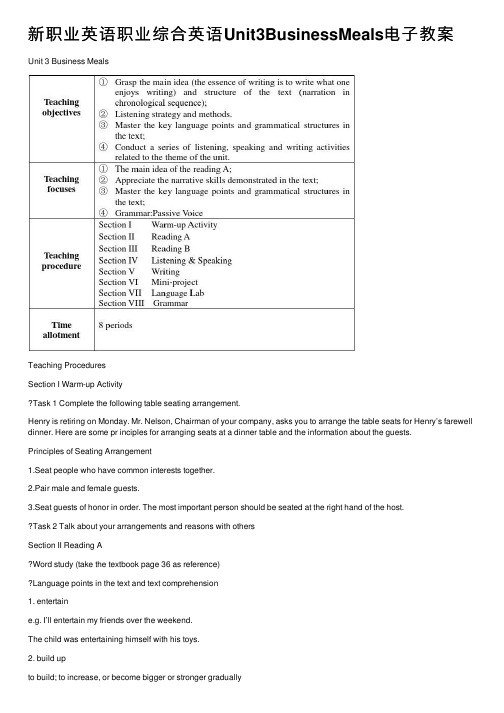
新职业英语职业综合英语Unit3BusinessMeals电⼦教案Unit 3 Business MealsTeaching ProceduresSection I Warm-up ActivityTask 1 Complete the following table seating arrangement.Henry is retiring on Monday. Mr. Nelson, Chairman of your company, asks you to arrange the table seats for Henry’s farewell dinner. Here are some pr inciples for arranging seats at a dinner table and the information about the guests.Principles of Seating Arrangement1.Seat people who have common interests together.2.Pair male and female guests.3.Seat guests of honor in order. The most important person should be seated at the right hand of the host.Task 2 Talk about your arrangements and reasons with othersSection II Reading AWord study (take the textbook page 36 as reference)Language points in the text and text comprehension1. entertaine.g. I’ll entertain my friends over the weekend.The child was entertaining himself with his toys.2. build upto build; to increase, or become bigger or stronger graduallye.g. They have built up a good reputation.The noise built up until she cou ldn’t stand it any longer.3. formala. appropriate for official or serious situations or occasionse.g. I only wear this suit for formal dinners.Our boss is very formal; she doesn’t call anyone by their first name.4. implyv. to make something understood without expressing it directlye.g. I do not imply that you are wrong.5. urgencyn. something very important and needing to be dealt with immediatelye.g. Well, take it easy! It isn’t a matter of urgency.6. companyn. the state of being with someonee.g. Rita’s husband is away for the week, so I thinkI’d better go over and keep her company.7. turn outto have a particular result; to happen in a particular waye.g. That man we met turned out to be Maria’s second cousin.Don’t worry. I’m sure it will all turn out fine.8. payv. to bring a good result or advantage for someonee.g. It usually pays to tell the truth.9. be on one’s best behaviorto behave as well and politely as you can, especially in order to please someonee.g. I want you to be on your best behavior at Granddad’s.10. knowledgeablea. (of a person) knowing a lote.g. Dick is very knowledgeable about wines.11. see sb. through (something)to help someone continue doing something, especially something difficult or unpleasant, until it is finishede.g. This overcoat has seen me through many severe winters.He saw me through all the hard times.12. intelligenthaving a high level of mental ability; good at understanding ideas and thinking quickly and clearly e.g. All teachers regard Jimmy as an intelligent student.intelligentlyad. in an intelligent waye.g. You have to speak intelligently at this important business meeting.13. come in handyto be usefule.g. I’ll put these bottles in the cupboard—they might come in handy someday.Reading A—Language points in14. conductv. to behave in a particular way, especially in a situation where people judge you by the way you behave;to carry out e.g. Public figures have a duty to conduct themselves responsibly.The company conducted a survey to find out what their customers think about the newproduct.15. concentrate (on)v. to think very carefully about something that you are doinge.g. She was concentrating on her book and didn’t know what had happened.16. sought-aftera. wanted by a lot of peoplee.g. Doctors are the most sought-after people in the area.After-reading exercisesTask 1 Read the passage. Then match the business meals with their characteristics.Task 2 Decide which of the following behaviors are Do’s or Don’ts for business meals according to the passage. Business know-howGiving Gifts●Give gifts during special holidays, or as "thank-yours" for special invitations;●Do not give expensive gifts;● A small cultural gift from your country is usually appropriate;●Package your gift nicely, with a card attached to it.Section III Reading BReading it to get the main idea and do the exercises followed.Section IV Listening & SpeakingTask 1 Peter is meeting a guest at the airport. Listen to the conversation and choose the bestanswer to each question you hear.Task 2 Listen to the conversation and fill in the blanks with what you hear.Task 3 John works in Season Hotel. He is receiving a phone call. Listen to the conversation andfill in the hotel reservation form below.Task 4 Listen to the conversation and decide whether the following statements are true or false.Then write key words to support your answers.Task 5 Listen to the passage twice and fill in the blanks with what you hear.Section V WritingTask 1 Work in pairs. Discuss the questions below.1. On what occasions do people send and receive invitations?2. What information is usually included in an invitation?Task 2 Read the invitations below and complete the following statements.1. The dinner for ________________________ will be held at Grand Hotel.2. Sarah invites her friends to ___________________.3. “RSVP” means ___________________________________________________.5. Bob invites Lisa to _______________.Task 3 Write an invitation to one of your classmates. And when you receive an invitation,make a response by accepting or declining it.Section VI Mini-projectWork in groups. Search online for the rule of table setting for a western dinner. Then set the following tableware and explain to the class.Work in groups;Search the Internet for rules of table setting;Pay attention to the functions of different pieces of tableware;Good time management and cooperation;In-class oral presentation.Section VII Language labTask 1 Match the words or phrases on the left with their meanings on the right.Task 2 Complete the following sentences with the words or phrases from Task 1. Change theform if necessary.Task 3 Rewrite each of the following sentences with the words or phrases given in thebrackets. Change the form if necessary.Task 4 Rewrite the following sentences after the models.Task 5 Translate the following into English using the given words or phrases. (take the textbookpage44-45 as reference)Section VIII GrammarPassive V oice (被动语态)语态是动词⽤以说明主语和谓语之间关系的⼀种形式,英语有两种语态:主动语态(Active V oice)和Passive V oice (被动语态)。
(G3)Unit3电子教案
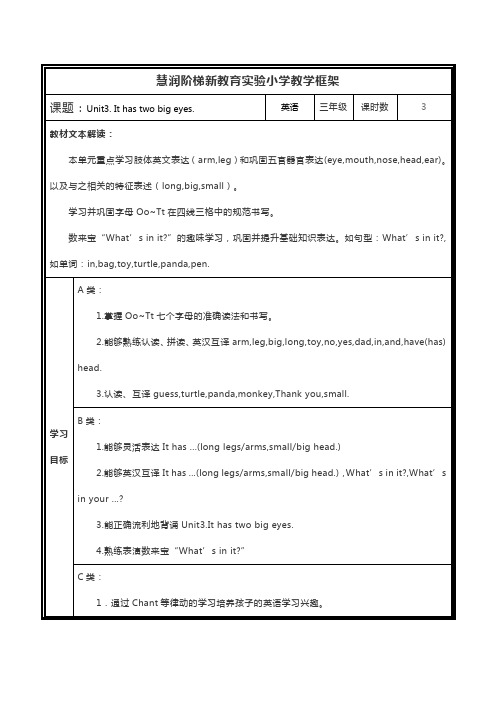
B类:
1.能够灵活表达It has ...(long legs/arms,small/big head.)
2.能够英汉互译It has ...(long legs/arms,small/big head.),What’s in it?,What’s in your ...?
教学板块
学生学习清单
第一课时
教学目标:
1.认读、拼读、英汉互译arm,leg,big,toy,no,dad,have(has).
2.诵读Zhou lin, look!
What's this?
Guess!
A toy turtle?
No. It has two big eyes.
3.完成诵读部分的英汉互译
2.老师打拍说唱
3.A/B组PK(Chant)
4.挑选优秀个体展示
学生跟着老师打拍说唱
优秀学生展示
板块三:Part9学习
1.老师指导书写练习单词
arm,leg,panda,monkey
2.说并翻译重点句型4句
What’s in it?
It has long legs/arms.
It has a small/big head.
3.能正确流利地背诵Unit3.It has two big eyes.
4.熟练表演数来宝“What’s in it?”
C类:
1.通过Chant等律动的学习培养孩子的英语学习兴趣。
2.通过字母的书写练习提升学生的书法水平。
预习
作业
1.预习五官部位的说法
2.用铅笔画出Part1—Part6中不认识的单词
(完整版)Unit3Where-did-you-go教案
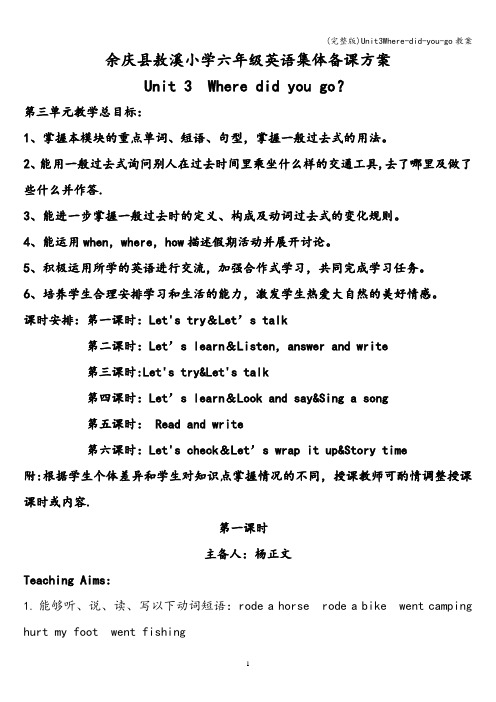
余庆县敖溪小学六年级英语集体备课方案Unit 3 Where did you go?第三单元教学总目标:1、掌握本模块的重点单词、短语、句型,掌握一般过去式的用法。
2、能用一般过去式询问别人在过去时间里乘坐什么样的交通工具,去了哪里及做了些什么并作答.3、能进一步掌握一般过去时的定义、构成及动词过去式的变化规则。
4、能运用when,where,how描述假期活动并展开讨论。
5、积极运用所学的英语进行交流,加强合作式学习,共同完成学习任务。
6、培养学生合理安排学习和生活的能力,激发学生热爱大自然的美好情感。
课时安排:第一课时:Let's try&Let’s talk第二课时:Let’s learn&Listen,answer and write第三课时:Let's try&Let's talk第四课时:Let’s learn&Look and say&Sing a song第五课时: Read and write第六课时:Let's check&Let’s wrap it up&Story time附:根据学生个体差异和学生对知识点掌握情况的不同,授课教师可酌情调整授课课时或内容.第一课时主备人:杨正文Teaching Aims:1.能够听、说、读、写以下动词短语:rode a horse rode a bike went camping hurt my foot went fishing2。
能够运用一般过去时询问别人在过去的某个时间点去哪里及所做的事情并做答。
Teaching Key and Difficult points:1. 本课时的教学重点是掌握5个动词短语的过去式形式。
2.本课时的教学难点是以下两个句子的运用:Where did you go last Saturday?What did you do there?教师要多示范,通过有针对性的反复操练知道学生熟练掌握。
(捷进英语2)Unit3-电子教案
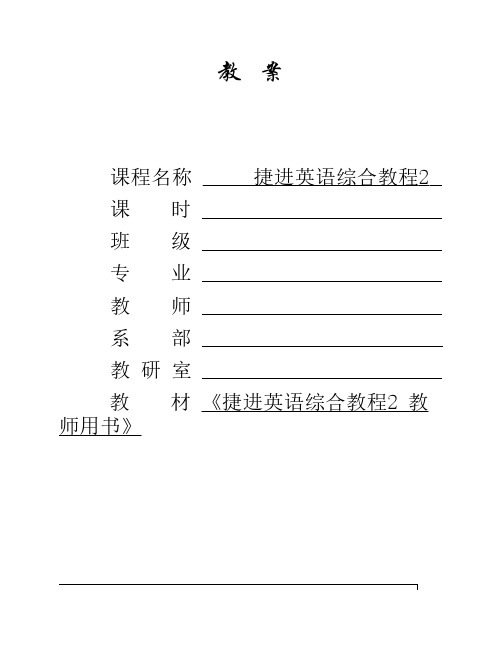
fund
raising events
they have taken
part in and why.源自The first task shows students how to create a text plan – essentially these are a scaffolded notes of the overview of a text. Tasks 2 and 4 practice detailed understanding and Task 3 practises scanning for specific numbers.
The Grammar Focus part looks at comparatives – the…the, … and …, as…as. Often many students will have only covered comparative adjectives and adverbs by this stage so you might want to spend more time on explaining the rules before going onto Tasks 2 and 3. Beyond the text encourages Ss to react to a
Wrap-up
作业
time to formulate ideas.
This section provides a quick review of the vocabulary, grammar, writing and theme of the unit.
Tasks could be set for individual work or done in pairs.
新编实用英语电子教案Unit 3

Unit 3Imitating Mini-Talks1 Work in pairs. Look at the pictures and practice the following mini-talks for giving directions. Acting out the Tasks2Work in pairs and act out the tasks by following the above mini-talks.Studying Maps3Maps are helpful in giving and understanding directions. Now let’s get familiar with the following sample maps.Following Sample Dialogues4 Read the following sample dialogues and try to perform your own tasks.Putting Language to Use56SECTION II Being All EarsLearning Sentences for Workplace Communication 1 Listen to 10 sentences for workplace communication cross-referenced with their Chinese2Listen to the following sentences for workplace communication in Column A and match each one with its Chinese version in Column B.3 Listen to 6 sentences for workplace communication and choose their right responses.Handling a Dialogue4Understanding a Short Speech/Talk5 Now listen to a short talk and fill up the blanks according to what you have heard. The wordsSECTION III Trying Your HandPracticing Applied Writing2Find from the box the English equivalents to the signs given in Chinese. key: a-5, b-6, c-9, d-7, e-4, f-10, g-3, h-8, i-2, j-1Writing Sentences and Reviewing GrammarKey:1. butter2. much doubt3. movies4. passengers5. much education6. room numbers7. a large population8. fear9. information6Correct the errors in the following sentences.1. All the news is interesting to us.2. We all like your idea of using the money to build a primary school.3. If he refuses to pay, I shall take measures against him.4. What lovely hair you have!5. The Johnsons have just moved into a large house and are planning to buy muchnew furniture.6. Mary likes potatoes better than tomatoes.7. It was such a long journey that we felt very tired when we arrived.8. My father never gave me much advice.9. Our school bought two pieces of equipment for the lab.10. In modern age, electronics has been developing very fast.11. He did too little preparation for his examination.12. There is/are a book, two pencils and three notebooks on the desk.13. Every means has been tried but without much success.14. Ten dollars is all that I can afford to pay for the recorder.SECTION IV Maintaining a Sharp EyePassage I Funny Road Signs from around the World! Information related to the reading passageAmerica is a nation on wheels. Americans use their cars even for very short distances such as going to the neighborhood store to buy some groceries. The average household owns two cars, trucks or sport vehicles and one in four owns three or more.Ninety percent of Americans drive to get where they need to go, reporting an average of 87 minutes a day behind the wheel. For car commuters, it’s an average of 100 minutes. Cities like Atlanta, San Bernardino and Riverside, Calif., have difficult commutes as the result of city sprawl. In Atlanta, 12.7% of commuters spend more than an hour getting to work, and in the “Inland Empire”,which includes San Bernardino and Riverside, 15% of commuters take more than an hour to get to the office.About a third can be classified as aggressive drivers. Six in ten concede they sometimes go well over the speed limit. Sixty-two percent occasionally get frustrated behind the wheel, more than four in ten get angry and two in ten sometimes boil into road rage. And nothing fuels driver anger like getting stuck in a traffic jam.Anyway, the road still offers more freedom than frustration. Three quarters of Americans saydriving often gives them a sense of independence, and nearly half say it’s often relaxing. Four in ten love their cars — not just like them, but love them.Language Points1 Explanation of difficult sentences1. (Para. 2)Taking pictures of funny road signs while traveling is a favorite pastime for manytravelers.Analysis: The gerund phrase beginning with taking is the subject of the sentence, in which while travelling (= while they are travelling) is the time adverbial of the verb taking.Translation: 旅行过程中拍一些有趣滑稽路牌的照片对很多旅行者来说都是一大消遣乐事。
Unit 3-课时1-Part A(教案)人教版PEP(2024)英语三年级上册

练习
1.展示Chen Jie, Binbin, Mike的问答,强调不同的回答。
2.讲解调查活动的要求,每位学生发一张调查表,可以事先让学生写上自己想调查的学生名字
3.学生相互问答完成调查(老师需要注意在学生调查时及时督促学生整句输出,尤其是答句部分,切勿只回答Yes或No)
Let’s learn
Letters
and sounds
1.引入
合唱字母歌
TT:Let’s sing alphabet song together.(让学生知晓字母名)
写下或多媒体展示Ii-Ll,教书写
TT:This is letter...Let’s trace together.(可以多种方式让学生写:本上写,用手指空中写,身体部位空中写)
3.老师做动作,学生猜测并说出对应的动物。然后可以邀请学生上台做动作让台下的学生猜。
3.重点讲解及练习
1. TT:nd Mike are talking. Let’s have a look.
2.播放音频,学生听。最后老师可提问Does Mike have a pet? Does Binbin have a pet?及Does Chen Jie have a pet?
2. TT: Can you guess whose hands are these?
3. TT: What animals do you know?
4. Now let’s sing a song about animals.
播放单元封面Let’s chant歌曲音频,然后可以结合TPR进行歌曲内容的讲解,最后可以再播放一遍音频,让学生跟着唱。
课程名称Unit3 Amazing animals
中职《英语基础教程》第三册-Unit3-电子教案
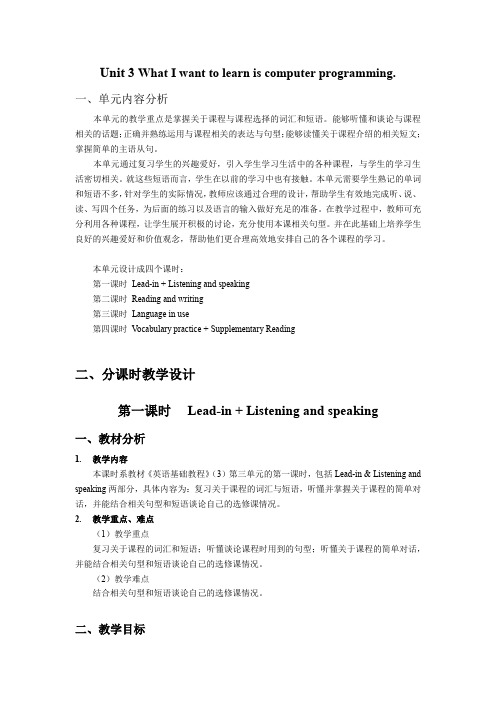
Unit 3 What I want to learn is computer programming.一、单元内容分析本单元的教学重点是掌握关于课程与课程选择的词汇和短语。
能够听懂和谈论与课程相关的话题;正确并熟练运用与课程相关的表达与句型;能够读懂关于课程介绍的相关短文;掌握简单的主语从句。
本单元通过复习学生的兴趣爱好,引入学生学习生活中的各种课程,与学生的学习生活密切相关。
就这些短语而言,学生在以前的学习中也有接触。
本单元需要学生熟记的单词和短语不多,针对学生的实际情况,教师应该通过合理的设计,帮助学生有效地完成听、说、读、写四个任务,为后面的练习以及语言的输入做好充足的准备。
在教学过程中,教师可充分利用各种课程,让学生展开积极的讨论,充分使用本课相关句型。
并在此基础上培养学生良好的兴趣爱好和价值观念,帮助他们更合理高效地安排自己的各个课程的学习。
本单元设计成四个课时:第一课时Lead-in + Listening and speaking第二课时Reading and writing第三课时Language in use第四课时V ocabulary practice + Supplementary Reading二、分课时教学设计第一课时Lead-in + Listening and speaking一、教材分析1.教学内容本课时系教材《英语基础教程》(3)第三单元的第一课时,包括Lead-in & Listening and speaking两部分,具体内容为:复习关于课程的词汇与短语,听懂并掌握关于课程的简单对话,并能结合相关句型和短语谈论自己的选修课情况。
2.教学重点、难点(1)教学重点复习关于课程的词汇和短语;听懂谈论课程时用到的句型;听懂关于课程的简单对话,并能结合相关句型和短语谈论自己的选修课情况。
(2)教学难点结合相关句型和短语谈论自己的选修课情况。
二、教学目标1.知识目标(1)学习并识记关于课程的词汇与短语,如:Latin dance computer programming Japanese tourism English appliance repair Chinese painting ask for your advice optional course get a certificate time schedule sign up by oneself(2)学会能套用谈论课程的句型,如:I’d like to ask for your advice. Sure. Go ahead.What I want to learn is…Can I get a certificate? You can get it …What’s the time schedule? There are …How do I sign up? You may fill in …2.能力目标(1)能听懂关于课程的对话。
人教版九年级英语 Unit3 优质课教案(全)
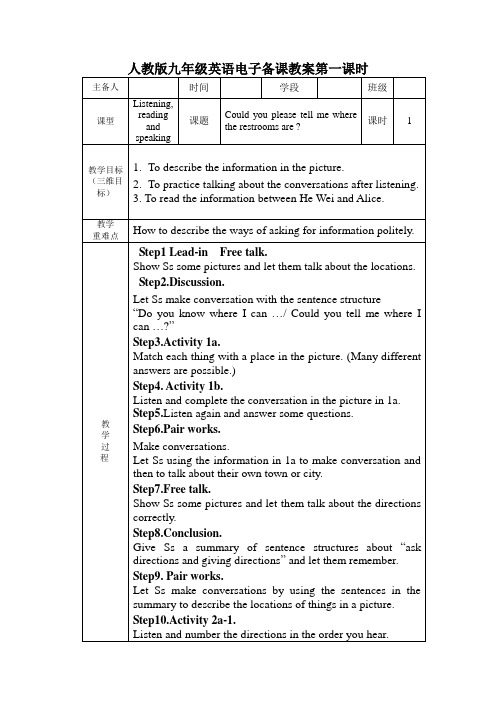
Step7.Free talk.
Show Ss some pictures and let them talk about the directions correctly.
nguage points:
explain the key words and phrases in section A-2
教学
反思
人教版九年级英语电子备课教案第三课时
时间
学段
班级
课型
Gou tell me where the restroom are ?
—Sorry,I’m not sure how to get there.
3.Iwonder where we should go next.
—You should try that new ride over there.
4.Could you tell us when the band starts playing this evening?
Step7.More exercises.
1.Choosing the right answers.
plete sentences.
3.Exchanges of sentence structures.
The exercises of Secondary School Entrance Exams
Step8.Conclusion.
Give Ss a summary ofsentencestructures about“ask directions and giving directions”and let them remember.
全新版大学英语第三册第二版电子教案Unit3
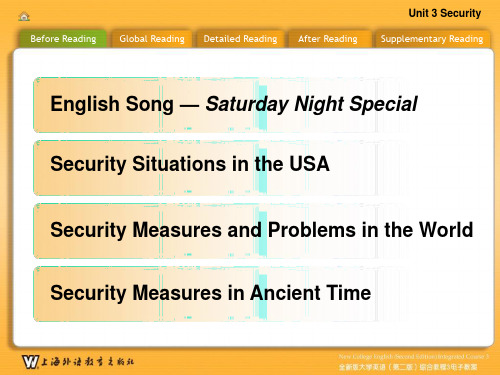
Before Reading
Global Reading Detailed Reading
After Reading
Unit 3 Security Supplementary Reading
On the morning of September 11, 2019, the United States of America awoke to find itself under attack. Several terrorist attacks within an hour wreaked havoc in New York CityDetaailenddReadiWng ashington, D.C., causing widespread devastation and more than five thousand casualties on September 11, 2019. It was the deadliest day in American history, costing more lives than the attack on Pearl Harbor or D-Day. Separate hijacked commercial airliners hit both of the World Trade Center towers in Manhattan, setting them on fire and leaving gaping holes in each. Both eventually collapsed to the street below.
Unit 3 Security Supplementary Reading
Big Jim’s been drinking whiskey Playin’ poler on a losin’ night Pretty soon old Jim starts thinking Somebody’s been _c_h_e_a_ti_n_g_and lying
凤凰职教第三册Unit3电子教案
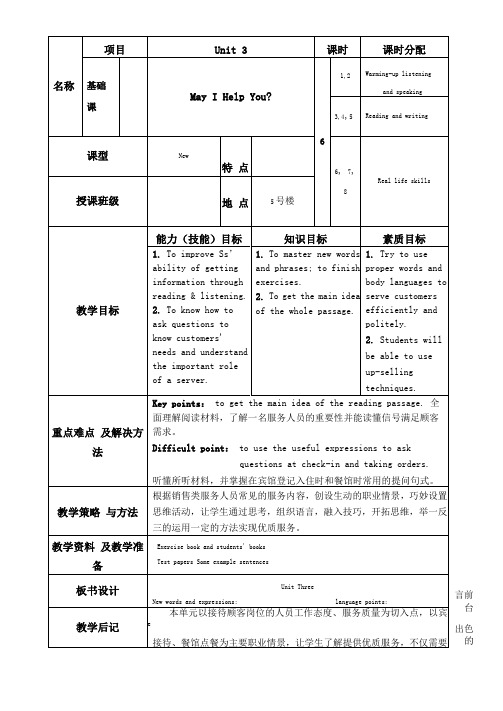
Smith.
I'll be checking out on
Friday.
Non-smoking, if you
please
Credit card, if you accept
Visa.
Do you need to see my
passport.
Activity 3 Suppose you work the fron to get the following information.
知识目标
素质目标
1.To improve Ss’ ability of getting information through reading & listening.
2.To know how to ask questions to know customers' needs and understand the important role of a server.
我来给旅馆打电话,通知他 们我们明天入住。
fCheck out结账离开,结账退 房
They packed and checked out of the hotel.
他们收拾好东西,办理了退 房手续。
I was disappointed to miss Bryan, who had just checked out...
Mr. Smith manages a large department store.
史密斯先生经营一家大型百货 公司。
fmanage to do sth经过努力克 服困难,设法做成某事Given a chance, I will manage to do the work well.
- 1、下载文档前请自行甄别文档内容的完整性,平台不提供额外的编辑、内容补充、找答案等附加服务。
- 2、"仅部分预览"的文档,不可在线预览部分如存在完整性等问题,可反馈申请退款(可完整预览的文档不适用该条件!)。
- 3、如文档侵犯您的权益,请联系客服反馈,我们会尽快为您处理(人工客服工作时间:9:00-18:30)。
第二迁移到美洲开始与欧洲在16世纪的现代时期的开始扩张。 1492年,哥伦布说服西班牙国王和王后为了资助他的航程。他认为,欧洲的帆船从西,他可以达到远东。他没有成功,而是他降落在巴哈马群岛的一个在加勒比海和“发现”新大陆。根据哥伦布发现,西班牙国王可以要求在美洲地区,后来西班牙征服了新的土地,并建立了一个庞大帝国,抓住了印度人的巨大财富。在1497年,另一家意大利水手,谁是约翰卡博特在英国国王的服务在今天抵达加拿大,和英国国王声称,在整个北美地区属于英国。执行这项索赔,英国人开始建立由17世纪初在北美的永久定居点。
美国大陆的人居住,作为两个结果长期持续的移民运动,第一个来自亚洲,欧洲和非洲的第二位。第一乐章开始大概25 000年前,当西伯利亚部落,在新的狩猎区或从追求寻求避难的敌人,在越过白令海峡到达阿拉斯加。到1492年,超过10-20万人,误称为居住克里斯托弗哥伦布在美洲,印第安人。他们发展了自己的原住民文化,从原始的部落那些从简单到复杂不等的阿兹特克人,印加人,玛雅人和灿烂的文明。但他们的技术发展已经落后于欧洲和亚洲。
对新出现的新力量的背景下,英国殖民地,将成为美国在北美种植。
The Settlement in Virginia
第一批英国永久定居于1607年在弗吉尼亚州。这是由一个由英国国王詹姆斯一世的公司章程伦敦公司组织发送的144至弗吉尼亚州英三人小型船舶。在跨越大西洋的远航,44人死亡,100名幸存者的河流一边降落,詹姆斯河,他们在他们的国王命名,并开始建立一个小镇称为詹姆斯敦。 100殖民者的大多是冒险的英国绅士,包括一些商业人士谁拒绝做任何手工劳动,也没有多少人愿意劳动者。然而,伦敦的公司曾希望有一个快速的投资回报,并指示他们对黄和其他财富追捕,尽快为他们在弗吉尼亚州降落。当殖民者定居下来,他们没有种植粮食。相反,其中一些劳动者开始挖掘黄金和其他财富的外观,同时这些英国绅士闲置,无所事事。不幸的是,什么也没有找到。很快,他们遇到了粮食短缺。当第二组的男子被送到了伦敦与物资公司,除第一次来港定居人士38人死亡。詹姆斯敦是一个很大的危机。然后了约翰史密斯上尉领导。他让每个人施加的工作纪律。几年后,另一个殖民地,约翰罗尔夫开始尝试与西印度烟草和生长良好,这家工厂在弗吉尼亚州的土壤。烟草种植的迅速蔓延向上和向下的解决,取得了出售烟草到欧洲的利润。与此同时,约翰罗尔夫娶了一个印第安部落长公主。这导致了婚姻的结束两岸敌对状态的白人和印第安人的一段时间。烟草的种植保存定居者和婚姻的时间发展的殖民者。
Text
什么是美国的?这已经成为一个经典的问题不仅是美国访问的外国人,更是美国人常常问自己。当美国人感到困惑,或者当他们在危机时,他们问他们是谁,并试图找出什么是美国人的手段。事实上,这个著名的问题时,首先问一个法国人称为J.海克特圣约翰日克雷弗克谁定居在宾夕法尼亚州的18世纪。在1782年,这个法国农民在伦敦出版了一本书,从美国的农民,他所提出的问题,并回答了自己提出的信:“那么,什么是美国,这个新好男人?他要么是欧洲,或子孙欧洲,因此,随着血液中奇妙的混合在一起,你会发现在没有其他国家。我可以向你指出,一个家庭,其祖父是英国人,他的妻子是一位荷兰人,他的儿子娶了一位法国妇女,其目前有4个儿子现在4个不同国家的妻子。他是美国人,谁在他身后留下他的所有古老的偏见和方式,收到他的生活已经接受,他的新政府遵循的新模式新,而新职,他认为。? ? ?在这里个人的所有国家都成为一个男人,他们的劳动力和子孙后代新一轮融化总有一天会导致世界。? ? ?美国是一个新好男人,谁原则的行为后,新的巨大变化,他因此必须招待新的想法,和形式。? ?新意见?这是一个美国人。“
第二个主要力量,对欧洲现代发展带来了文艺复兴时期,这是由一个改变生活面貌显着。上帝为中心的世界是在挑战自然和社会科学的重大进展。人们开始对自己更有信心,表现出更多的关于他们在全世界的利益。许多挑战圣经的权威。并愿意观察,实验和测试自己的真理。这种态度推动了技术的发展。
第三个有影响力的是宗教改革,宗教的改革运动,从德国开始。在1517年,马丁路德,德国的神学教授,提出了“九十五条论纲”,防止滥用和腐败抗议教会的教堂大门。他认为,教皇无权出售“的宽容,为缓解的罪孽”。他认为,有罪的人既可以赢得良好的工作也不是通过教会和教宗得救,但只有在耶稣基督的信仰,并通过直接关系到上帝。而唯一真正的指南上帝的意志是圣经。由于马丁路德反对天主教会抗议,宗教改革来到被称为新教改革。马丁路德后不久开始了他的反抗,约翰加尔文,法国人,谁逃到瑞士,开始了他的改革运动。加尔文曾在英国许多追随者将稍缓。在英格兰,亨利八世,因为与罗马天主教会的政治争端和,因为他的个人婚姻问题,脱离了罗马天主教会,并成立英国教会,他成为英国教会负责人自己。这些宗教的改革有许多共同之处。他们都提出了挑战教皇和天主教会的权威控制人民的宗教信仰和民族国家政治事务的干扰。谁支持的个人认为,人可以拯救只有通过建立一个信仰与上帝直接接触,通过教会或其priests.These改革没有,改革基督教信徒反映了在欧洲的民族主义的兴起,代表了需求资产阶级的自由发展,并表达了普通劳动人民的愿望,特别是为从农奴的封建统治的解放。因此,新教改革表示欢迎的领导人,中产阶级和欧洲劳动人民,特别是在西欧国家。因此,新教徒和面额远播。
Europe in the 16th and 17th Centuries
在北美英国永久定居点始于17世纪时,西欧正在经历的巨大变化。在中世纪时期(公元500年之间和AD1500),欧洲是根据罗马天主教会的单一精神权威。在封建农奴制度的盛行。农民或农奴被束缚在土地上,并在他们的领主下地干活。商人和工匠残疾人的社会混乱。艺术和学习是由教会控制。到了16世纪,一些新的和强大的社会力量开始出现,而导致觉醒,欧洲和美洲的发现。第一个新的力量是资本主义的发展。资本主义的发展产生2 *,资产阶级和工人阶级的新类。随着商业和贸易的快速发展,日益强大的资产阶级在政治以及经济。他们希望分享封建领主,在一些国家,如英国的权力,他们希望从国王,使更多的权力,他们可以自由发展。英国革命是资本主义的这种增长的结果。
据克雷弗克,在那些日子里,美国有没有考虑到欧洲人的或其后代混血儿,如美洲印第安人和黑人其他民族。今天,美国情况较为复杂。在美国家庭中,有可能是儿子,儿媳或女儿女婿与欧洲后裔或非裔美国人和亚裔移民尽管这些白人混血与其他黑人或亚洲人的家庭占少数。为了理解这一点,美国,让我们回到美国的过去。
A New Land
